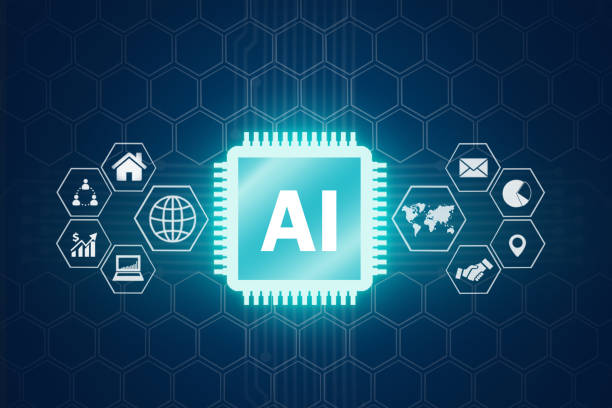What is Artificial Intelligence and what are its applications?

#ArtificialIntelligence (AI), in short, is a branch of computer science that deals with building machines that can perform tasks that usually require human intelligence.
These tasks include learning, reasoning, problem-solving, language understanding, and pattern recognition.
#ArtificialIntelligence is no longer a science fiction concept; it is rapidly becoming an integral part of our daily lives.
From movie recommendation systems on Netflix (Netflix) to self-driving cars (Waymo) and virtual assistants like Siri (Siri) and Alexa (Alexa), artificial intelligence is everywhere.
Its applications are very broad and include medicine, finance, education, manufacturing, transportation, and many other fields.
For example, in medicine, artificial intelligence can help diagnose diseases, develop drugs, and provide more personalized care.
In finance, it can be used to detect fraud, manage risk, and provide investment advice.
In the manufacturing industry, artificial intelligence can be used to optimize processes, reduce costs, and improve product quality.
Did you know that a weak company website loses you many opportunities every day? Solve this problem forever with professional corporate website design by Rasaweb!
✅ Create a powerful and reliable image of your brand
✅ Attract targeted new customers and increase sales
⚡ [Get a free website design consultation]
A brief history of artificial intelligence from the beginning to today

The idea of #ArtificialIntelligence dates back to the 1950s, when scientists like Alan Turing (Wikipedia) and John McCarthy (Wikipedia) began to explore the possibility of building machines with human intelligence.
The Dartmouth Conference in 1956 is considered a turning point in the history of artificial intelligence.
In the 1960s and 1970s, #ArtificialIntelligence witnessed significant progress, but hardware limitations and lack of data prevented it from fully realizing its potential.
In the 1980s and 1990s, with the emergence of more powerful computers and new algorithms, #ArtificialIntelligence flourished again.
Today, with access to a huge amount of data (Big Data) and significant advances in machine learning (Wikipedia) and deep learning (Wikipedia), #ArtificialIntelligence is experiencing a golden age and is rapidly changing the world around us.
Artificial intelligence is constantly evolving and is expected to play a much larger role in our lives in the future.
Machine Learning and Deep Learning: The Backbone of Artificial Intelligence

Machine Learning and Deep Learning are two important subsets of #ArtificialIntelligence that play a vital role in the development of intelligent systems.
Machine learning allows machines to learn from data without explicit programming.
In other words, instead of the programmer telling the machine exactly what to do, the machine uses specific algorithms to identify patterns and relationships in the data and make decisions based on them.
Deep learning is a more advanced type of machine learning that uses artificial neural networks (Wikipedia) with multiple layers to analyze data.
These networks are able to identify more complex patterns and perform better in tasks such as image recognition, natural language processing, and machine translation.
The main difference between machine learning and deep learning is the amount of human involvement and the amount of data required.
Machine learning usually requires more feature engineering, meaning that humans must identify the important features of the data so that the machine can learn them.
While deep learning can automatically extract important features from data, it requires a huge amount of data for training.
| Feature | Machine Learning | Deep Learning |
|---|---|---|
| Need for Feature Engineering | High | Low |
| Data Volume Required | Less | More |
| Complexity of Patterns | Simpler | More Complex |
| Type of Neural Networks | Shallow (if used) | Deep (with multiple layers) |
Natural Language Processing (NLP) and its role in understanding human language by artificial intelligence

Natural Language Processing (NLP) is one of the most important areas of #ArtificialIntelligence that allows machines to understand, interpret, and generate human language.
NLP includes a set of techniques and algorithms that help machines understand the structure, meaning, and context of language.
These techniques include Syntax Analysis, Semantic Analysis, and Pragmatic Analysis.
The applications of NLP are very broad and include machine translation (Google Translate), chatbots (HubSpot), sentiment analysis, speech recognition, and text generation.
For example, machine translation allows machines to translate text from one language to another.
Chatbots can answer users’ questions and help them perform various tasks.
Sentiment analysis can be used to determine people’s feelings and opinions about products, services, or events.
Speech recognition can be used to convert speech to text.
And text generation can be used to generate text content such as articles, stories, and reports.
Are you losing potential customers due to a non-professional website? Rasaweb is your answer! With our specialized corporate website design services:
✅ Enhance the credibility and position of your business
✅ Experience attracting more targeted customers
⚡ Act now to receive a free consultation!
Computer Vision and the ability of artificial intelligence to see and understand images

Computer Vision is another important area of #ArtificialIntelligence that allows machines to see, understand, and analyze images and videos.
Computer vision includes a set of techniques and algorithms that help machines detect objects, people, scenes, and activities in images and videos.
These techniques include Object Detection, Face Recognition, Image Segmentation, and Motion Detection.
The applications of computer vision are very broad and include self-driving cars, security systems, medical diagnosis, robotics, and many other fields.
For example, in self-driving cars, computer vision is used to detect obstacles, traffic signs, and other vehicles.
In security systems, computer vision can be used to recognize people’s faces and identify suspicious activities.
In medical diagnosis, computer vision can be used to detect diseases in medical images such as X-rays and MRIs.
In robotics, computer vision can be used to guide robots and perform various tasks.
Advantages and Disadvantages of Using Artificial Intelligence

Using #ArtificialIntelligence has many advantages.
#ArtificialIntelligence can help increase productivity, reduce costs, improve quality, make better decisions, and solve complex problems.
Machines can do things that are dangerous, difficult, or tedious for humans.
#ArtificialIntelligence can help collect, analyze, and process huge amounts of data and identify patterns and relationships that humans are unable to see.
This can lead to better decisions and solving more complex problems.
However, the use of #ArtificialIntelligence also has disadvantages.
#ArtificialIntelligence can lead to job losses, increased inequality, privacy violations, and ethical issues.
Machines may learn biases in the data and make decisions that are discriminatory or unfair.
Misuse of #ArtificialIntelligence can lead to violations of individuals’ privacy.
And the development and use of #ArtificialIntelligence can create complex ethical issues that need careful consideration.
What transformations will the future of artificial intelligence bring?

The future of #ArtificialIntelligence is very bright and full of potential.
It is expected that #ArtificialIntelligence will play a much larger role in our lives in the future and will create significant transformations in various fields.
#ArtificialIntelligence is likely to become a pervasive technology that will be present in all aspects of our lives.
Artificial intelligence (Wikipedia) can dramatically increase productivity, potentially through the automation of tedious tasks and decision-making assistance.
AI is predicted to transform various industries and create new opportunities and innovative solutions.
However, important challenges and ethical considerations must be addressed to ensure that AI is used responsibly and fairly for everyone.
Advanced AI can revolutionize robotics, medicine, and transportation.
| Field | Potential Transformations |
|---|---|
| Medicine | More accurate diagnosis of diseases, personalized medicines, robotic surgeries |
| Transportation | Self-driving cars, intelligent transportation systems, optimized traffic |
| Manufacturing | Full automation, higher product quality, mass customization |
| Customer Service | Intelligent chatbots, faster and more accurate responses, personalized services |
Ethical Issues and Challenges Facing Artificial Intelligence

The development and use of #ArtificialIntelligence creates important ethical issues and challenges that must be addressed.
These issues include bias, privacy, transparency, accountability, and security.
Machines may learn biases in the data and make decisions that are discriminatory or unfair.
Misuse of #ArtificialIntelligence can lead to violations of individuals’ privacy.
#ArtificialIntelligence decisions must be transparent and explainable so that they can be trusted.
It must be clear who is responsible for the consequences of #ArtificialIntelligence decisions.
And #ArtificialIntelligence systems must be protected against cyber attacks and abuse.
To solve these issues, there is a need to develop laws and regulations, create ethical standards, and provide public education and awareness.
Did you know that 94% of first impressions of a company are related to its website design?
Rasaweb helps you create the best first impression by providing professional corporate website design services.
✅ Create a professional and reliable image of your brand
✅ Attract potential customers more easily and improve online presence
⚡ Get a free corporate website design consultation
How can we prepare for a future with artificial intelligence?

To be able to benefit from the advantages of #ArtificialIntelligence and avoid its disadvantages, we must prepare for a future with #ArtificialIntelligence.
This preparation includes learning new skills, adapting to job changes, developing critical thinking, and being aware of the ethical issues of #ArtificialIntelligence.
Learning skills related to #ArtificialIntelligence such as programming, data analysis, and machine learning can help us find new jobs.
Given that #ArtificialIntelligence is reshaping the job market, we must be prepared to adapt to job changes.
We must strengthen our ability to think critically so that we can detect misinformation and make correct decisions.
And we must increase our awareness of the ethical issues of #ArtificialIntelligence so that we can make decisions about its responsible use.
Resources for learning and getting more information about Artificial Intelligence

There are many resources for learning and getting more information about #ArtificialIntelligence.
These resources include online courses (Coursera), books (Amazon), scientific articles (Google Scholar), blogs (OpenAI Blog), and conferences (NeurIPS).
Participating in online courses can help you learn the concepts and techniques of #ArtificialIntelligence.
Reading books can help you gain a deeper understanding of #ArtificialIntelligence topics.
Studying scientific articles can help you get acquainted with the latest advances in #ArtificialIntelligence.
Following blogs can help you stay informed about #ArtificialIntelligence news and events.
And attending conferences can help you connect with #ArtificialIntelligence experts.
By using these resources, you can increase your knowledge and skills in the field of #ArtificialIntelligence and prepare for a future with #ArtificialIntelligence.
FAQ
| Question | Answer |
|---|---|
| 1. What is Artificial Intelligence (AI)? | It is a branch of computer science that aims to create machines capable of simulating human intelligence and performing tasks that require human thinking, such as learning, problem-solving, and decision-making. |
| 2. What are the main types of AI? | It can be classified into Weak AI (Narrow AI) that focuses on a specific task, General AI that possesses comprehensive human capabilities, and Super AI that surpasses human intelligence. |
| 3. Mention some common applications of AI in our daily lives. | These include voice assistants (such as Siri and Alexa), recommendation systems (such as Netflix and Amazon), self-driving cars, facial recognition systems, and spam filters. |
| 4. What is the difference between Artificial Intelligence and Machine Learning? | Artificial intelligence is the broader concept of creating intelligent machines, while machine learning is a subset of artificial intelligence that focuses on enabling systems to learn from data without explicit programming. |
| 5. What is Deep Learning? | It is a subset of machine learning that uses multi-layered artificial neural networks (deep neural networks) to process data and discover complex patterns, and it is used in image and speech recognition. |
| 6. What are the most prominent benefits of AI? | Improving efficiency and productivity, automating repetitive tasks, making better decisions based on analyzing big data, and developing solutions to complex problems in fields such as medicine and science. |
| 7. What are the main challenges facing the development and deployment of AI? | These include the need for huge amounts of high-quality data, privacy and security issues, bias in data and algorithms, and high development and maintenance costs. |
| 8. Does AI raise ethical or social concerns? | Yes, it raises concerns related to privacy, algorithmic bias, job loss due to automation, responsibility for errors made by intelligent systems, and the need for a regulatory framework. |
| 9. How can AI affect the future of the labor market? | It can lead to the automation of some routine jobs, but it will also create new jobs that require advanced skills in developing, operating, and maintaining AI systems. |
| 10. What are some modern or promising technologies in the field of AI? | These include advanced Natural Language Processing (NLP) (such as large language models like ChatGPT), computer vision, robotics, and Generative AI. |
And other services of Rasa Web Advertising Agency in the field of advertising
Smart social media: a creative platform for improving customer behavior analysis with dedicated programming.
Intelligent data analysis: Designed for businesses looking to analyze customer behavior through Google Ads management.
Intelligent marketing automation: Transform SEO ranking with the help of real data.
Intelligent digital branding: Designed for businesses looking to engage users through attractive user interface design.
Intelligent direct marketing: Designed for businesses looking for digital branding through dedicated programming.
And more than hundreds of other services in the field of internet advertising, advertising consulting, and organizational solutions
Internet advertising | Advertising strategy | Advertorial report
Resources
Artificial intelligence, machine learning and deep learning: Reviewing concepts and differences
,What is Artificial Intelligence? Educational video
,Artificial Intelligence (AI)
,Artificial Intelligence (AI) – IBM
? Are you ready to transform your business in the digital world? Rasaweb Afarin, a leading digital marketing agency, with expertise in SEO, online advertising, and responsive website design helps you reach the peak of success and have a powerful presence on the web.
📍 Tehran, Mirdamad Street, next to the Central Bank, Southern Kazerun Alley, Ramin Alley No. 6
“`



